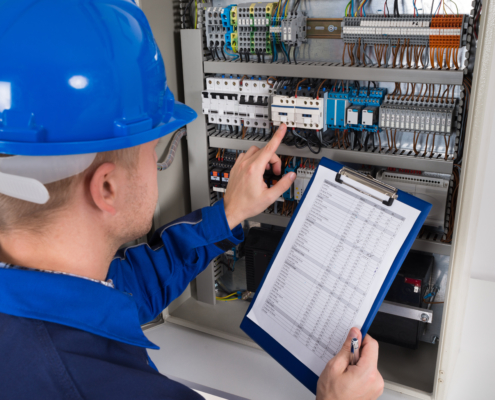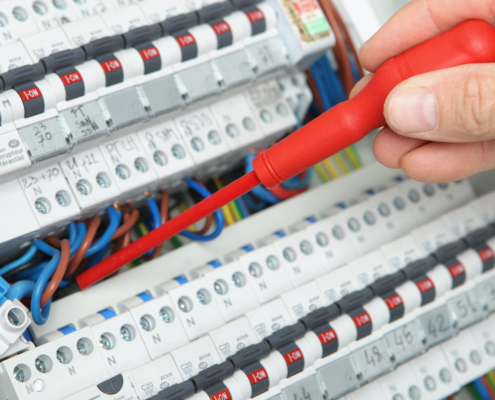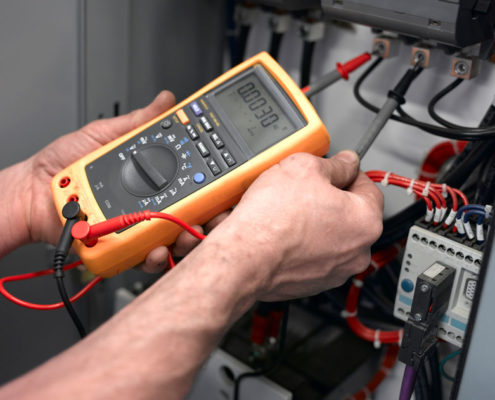What is Electrical Testing?
What is meant by electrical testing?
Electrical testing is a broad term that covers the assessment of electrical systems, components, or devices to ensure they function correctly, meet safety standards, and specified regulations.
It includes various types of testing for functionality, safety, performance, insulation, continuity, resistance, voltage, load, dielectric, and functional testing.
Electrical testing is crucial to make sure electrical products and installations are safe, identify deviations from standards, to ensure the reliability and safety of electrical equipment throughout its lifecycle.
Electrical inspection and testing
Electrical inspection and testing involve a thorough evaluation of electrical installations to ensure compliance with safety standards. This process includes visual inspections, functional testing, safety assessments, insulation resistance testing, continuity testing, and checks on devices like RCDs. The goal is to identify and address potential hazards, ensuring the safety and reliability of electrical systems. Periodic inspections by qualified professionals help prevent accidents, ensure compliance, and extend the lifespan of electrical installations.
Types of Electrical Testing
There are various types of electrical testing, each serving a specific purpose in assessing different aspects of electrical systems and components. Some of the most common electrical installation tests include insulation resistance testing, continuity testing, and ground fault circuit interruption (GFCI) testing.
Functional Testing: This checks whether electrical devices or systems perform their intended functions correctly and efficiently.
Safety Testing: Evaluates whether electrical equipment complies with safety standards to prevent hazards such as electric shocks, fires, or other risks.
Performance Testing: Assess the overall performance of electrical systems or components under different conditions, including efficiency, capacity, and response to varying loads.
See the full article on Electrical Installation Tests
Periodic Inspection
Over time and with use, electrical installations can experience deterioration. As a result, it is advisable to conduct regular inspections and tests to assess their condition and ensure they remain suitable for ongoing use, these teats or inspections are commonly referred to as ‘periodic inspection and testing’.
Periodic inspections play a crucial role in preventing electrical accidents, reducing the risk of fire, and maintaining the reliability of electrical systems over time. Property owners and businesses are often legally obligated to have periodic inspections conducted, and compliance with inspection recommendations is typically required.
Electrical Installation Condition Report
An Electrical Installation Condition Report (EICR) is a comprehensive document that provides a detailed assessment of the condition of an electrical installation. This report is generated following a thorough inspection and testing of the electrical systems within a building or facility. The primary purpose of an EICR is to evaluate the safety and compliance of the electrical installation with relevant regulations and standards.
See the full article on What Is an Electrical Installation Conditioning Report (EICR)?
Electrical installation Testing
Electrical circuits are complex and technical networks which require specialist training to understand and test. Electrical installation testing refers to the systematic process of evaluating and verifying the performance, safety, and compliance of an electrical installation. The goal is to ensure that the installation meets established standards and regulations, operates safely, and is suitable for its intended purpose. Electrical installation testing involves various measurements, inspections, and assessments to identify potential issues and ensure the integrity of the electrical system. Two main tests are required to ensure that electrical products are safe, New Installation Testing and Periodic Inspection Testing.
Read the article on Electrical Installation Testing Procedures for a full explanation
Is It a Legal Requirement to Have Electrics Tested?
There is not a specific law which states that you must carry out electrical testing in commercial properties. But the law does require you to ensure that your electrical systems are safe to use. The Electricity at Work Regulations (1989) state that all electrical equipment must be safe for employees to use. Therefore, it is down to the employer to verify that this equipment is tested and cleared as safe to use. Regular testing ensures that this legislation is followed and, more importantly, protects your staff from electrical accidents. Read more on Legal Requirements for Electrical Testing.
How often should electrics be tested UK?
In the United Kingdom, the frequency of electrical testing, also known as fixed wire testing or periodic inspection, depends on the type of premises and its use. The guidelines for electrical testing intervals are outlined in the IET Wiring Regulations (BS 7671)
Domestic Properties:
It is generally recommended to have an Electrical Installation Condition Report (EICR) conducted every 10 years. For a rental property, EICRs are typically recommended every 5 years or at each change of tenancy.
Commercial Properties:
Commercial properties, including offices, shops, and warehouses, usually require testing every 3 -5 years.
Buildings open to the public, such as cinemas and restaurants, may need more frequent testing, often every 1 to 3 years.
For additional electrical articles please visit our main BLOG page here





